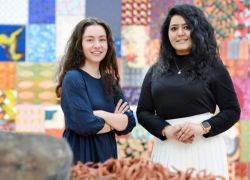Explore the big future of Nanotechnology
What is nanotechnology? What does it mean for society? Can it solve all of the major global problems?
These and other issues will be explored in a free lecture at the University of Teesside on Wednesday 9 May from 6.30pm-7.45pm. Entitled ‘When little is big’, the lecture will be held in the Centuria Building, Victoria Road, Middlesbrough and delivered by Professor Zulf Ali, Assistant Dean (Enterprise) from the University’s School of Science & Technology. Refreshments are available from 6pm.
Recent nanotechnology products include:
- a clear sunscreen cream
- stain repellent clothing
- Longer-life tennis balls
The lecture will describe work being undertaken at the University of Teesside on the use of small technologies to build devices that can perform chemical or biological operations in a chip format. These devices are made using techniques borrowed from the semiconductor, polymer and printing industries. The applications for such devices include the medical and forensic sectors. In medical diagnostics, there is a need for point-of-care devices that can be used by patients or non-specialist staff and offer cheaper, faster analysis.
Examples of such devices will include a glucose sensor for diabetes monitoring and also the University’s current work on creating a device to allow monitoring of deep vein thrombosis (DVT) and pulmonary embolism (PE). The failure to diagnose and treat DVT/PE has made it the most common cause of unexpected death in hospitalised patients in most developed nations.
Professor Ali said: “The lecture will describe nanotechnology as a diverse area of study and will argue that we should focus on the development of science and technology at the right size, where this size can range from nanometres to millimetres. Many existing nanotechology products and those we are likely to see in the near future are scaled-down versions of existing products. Nanotechnology is also more revolutionary in nature and so in the future nanotechnology will lead to products that have not yet been envisioned.”
For more information on the lecture call Lucy Owens on 01642 384255, or email alumni.office@tees.ac.uk
 Teesside University academics join prestigious network of
...
Teesside University academics join prestigious network of
... Curatorial studies culminating with international art
...
Curatorial studies culminating with international art
... Teesside animation graduates receive top regional Royal
...
Teesside animation graduates receive top regional Royal
...